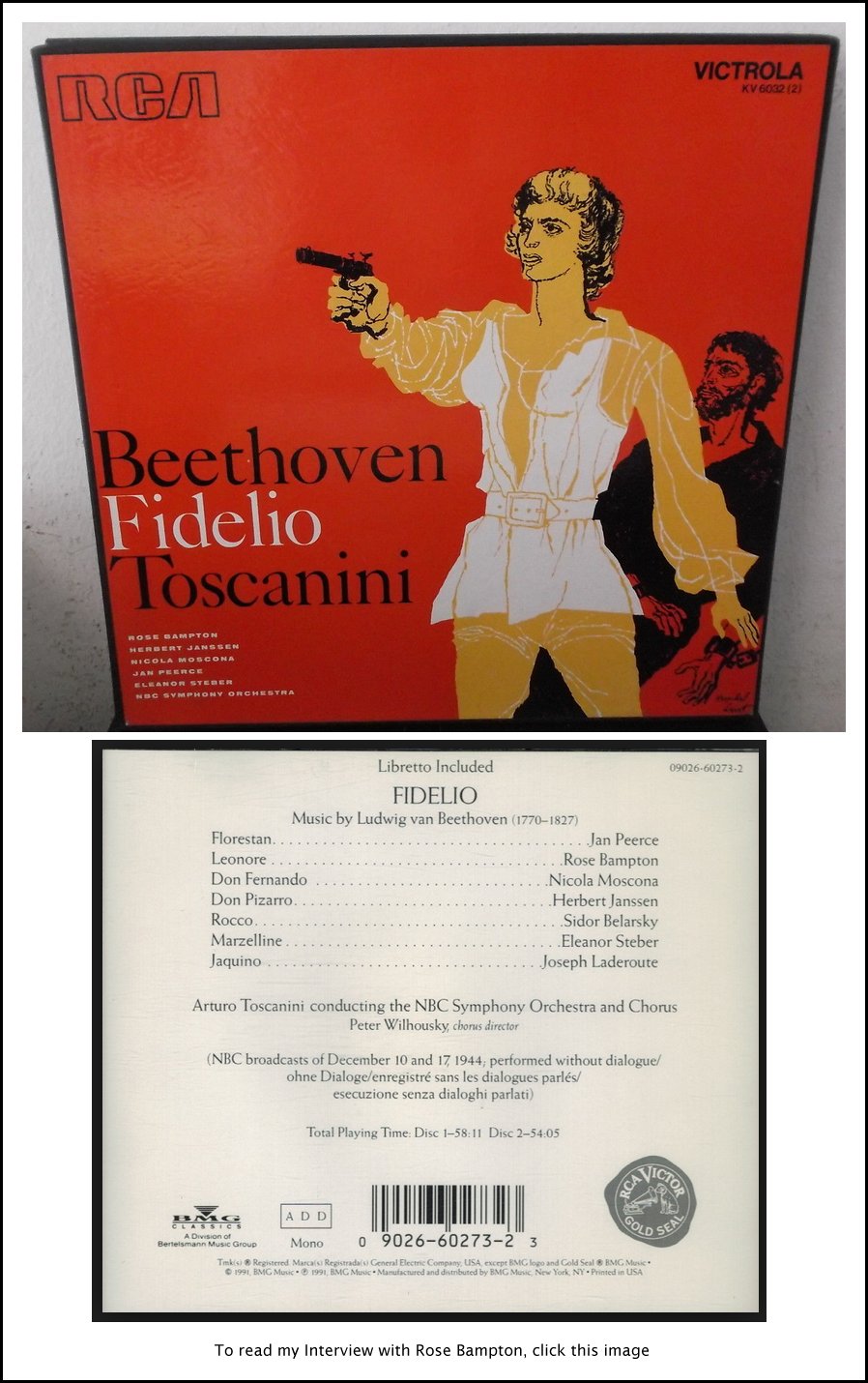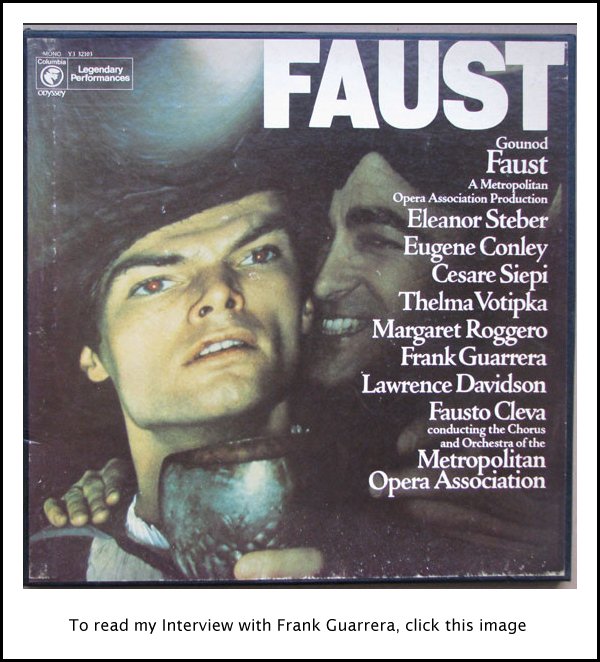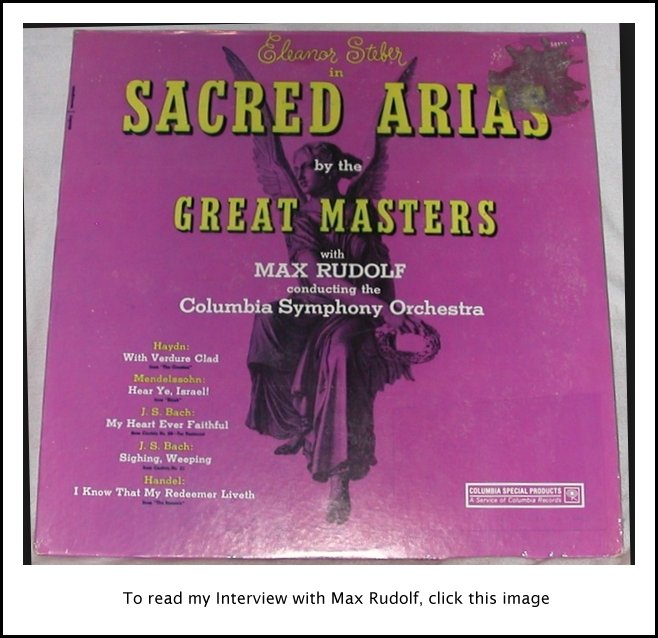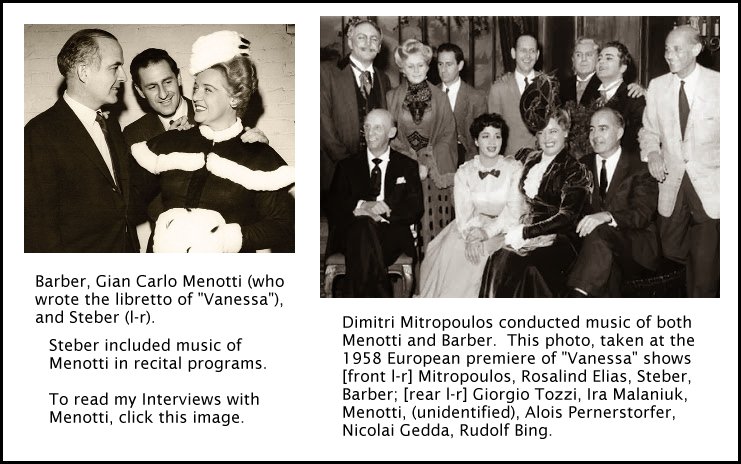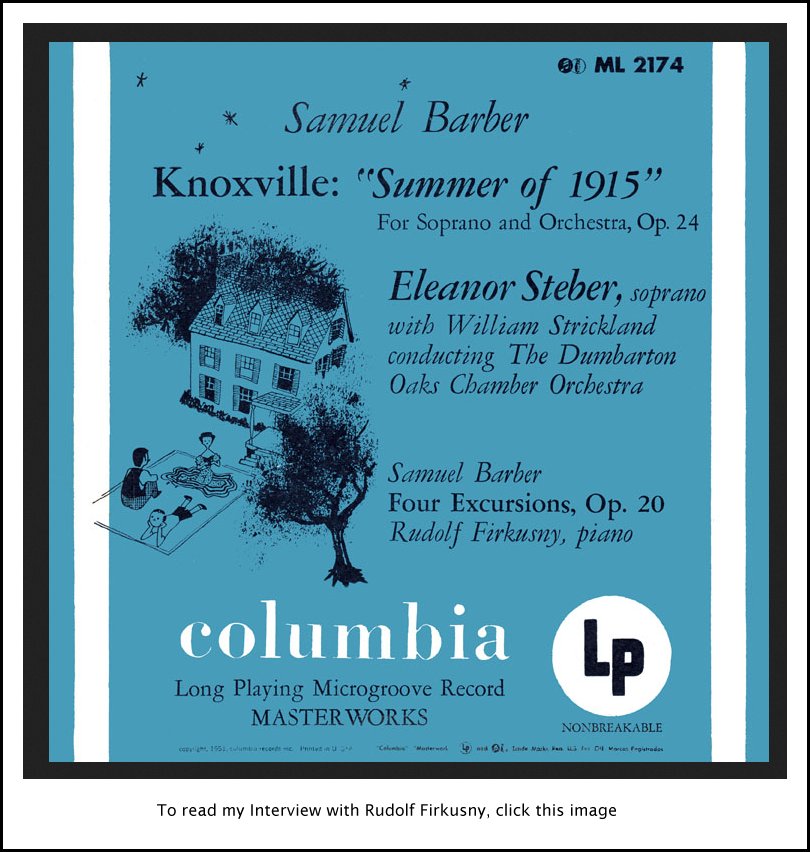Eleanor Steber Interview with Bruce Duffie . . . . . . . . . (original) (raw)
Soprano Eleanor Steber
A Conversation with Bruce Duffie
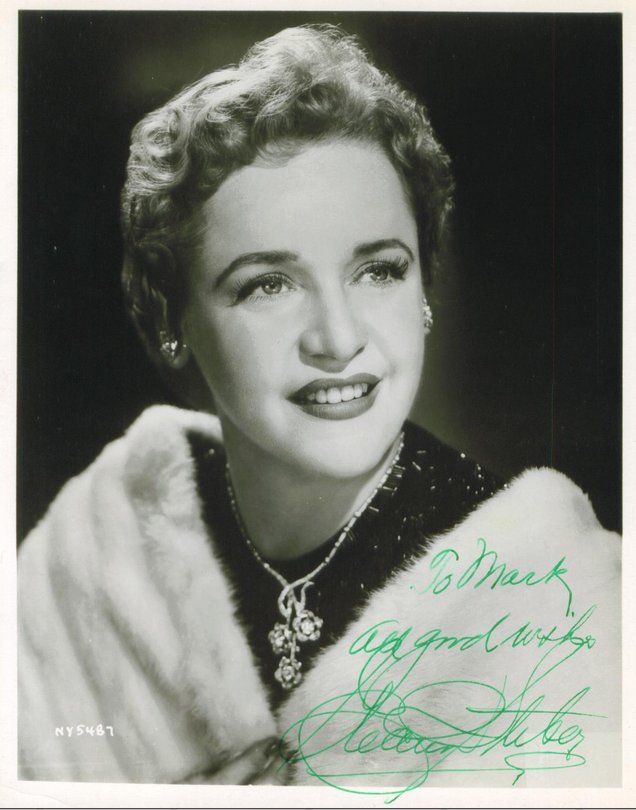
Eleanor Steber
Born: July 17, 1914 (not 1916) - Wheeling, West Virginia, USA
Died: October 3, 1990 - Langhorne, Pennsylvania, USA
The eminent American soprano, Eleanor Steber, grew up in a musical family. Her mother was an accomplished amateur singer and taught her voice and piano, took her to concerts, arranged for coaching, and strongly encouraged her to study and to sing in school and community shows. Eleanor later studied at the New England Conservatory in Boston, originally intending to major in piano, but her voice teacher, William Whitney, persuaded her to focus on singing, instead. She received Bachelor of Music in 1938. At the beginning she did a lot of radio, oratorio, and church work. Steber’s opera debut was in 1936, appearing as Senta with the Commonwealth Opera in a WPA production of Wagner's The Flying Dutchman, a demanding role indeed for a 21-year-old. In 1939, she went to New York to study with Paul Althouse who had a great influence on her. In 1940 she won first prize at the Metropolitan Opera Auditions of the Air, earning a Met contract.
Steber's first role at the Met was Sophie in Strauss’ Der Rosenkavalier on December 6, 1940. During the next years she benefited from conductors such as Bruno Walter, Sir Thomas Beecham, Erich Leinsdorf and George Szell. She was a versatile artist and appeared in Italian, French and German operas. Things began to change for her at the Met when Rudolf Bing took over the company in 1950. By this time, her career extended well beyond New York (San Francisco, Chicago and Europe). At the Met, though, she began to feel that she was being passed over for mainstream Italian roles in favour of Tebaldi and Callas. Altogether she appeared 286 times in New York and 118 times on tour. She sang 28 leading roles in an extremely large repertoire. Her easy upper range, coupled with a rich, smoothly produced lower voice made her a natural for Mozart roles, such as the Countess in Le nozze di Figaro, Pamina in Die Zauberflöte, Donna Anna in Don Giovanni, and even Konstanze in the Abduction from the Seraglio. The 1951 production of Così fan tutte, with Steidry conducting and Alfred Lunt directing, was a major event in the New York season and was recorded on Columbia LP records.
As her voice matured, Eleanor Steber sang some of the spinto roles in both the German and Italian repertoire. Her roles in this repertoire included Violetta, Elisabetta, Desdemona, Marguerite, Manon Lescaut, Mimì, Tosca, and the Marschallin in Der Rosenkavalier. In Wagner’s operas she sang Eva in Die Meistersinger von Nürnberg and Elsa in Lohengrin. She was also the company’s first Arabella in 1955, and in 1959 was the first to perform at the Met the challenging part of Marie in Alban Berg’s opera Wozzeck. In January 1958 she created the title role in Samuel Barber’s opera Vanessa, and commissioned his Knoxville: Summer of 1915.
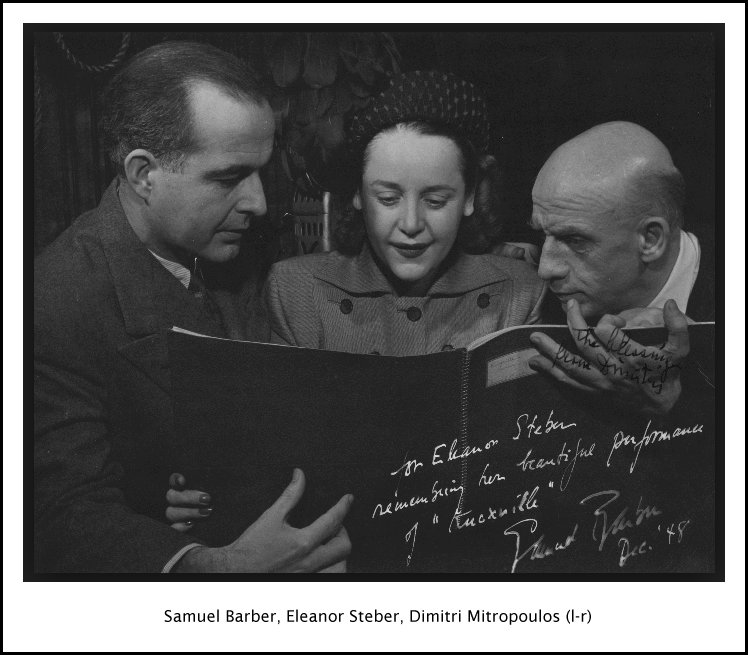
Her European engagements included appearances at Edinburgh (1947), Vienna (1953), and Glyndebourne. In 1953 she was amongst the first Americans to appear at the Bayreuth Festival after World War II. The very successful 1953 Elsa in the Bayreuth Lohengrin was recorded and issued by London/Decca; it is still in print on Sony CD.
In addition to opera and recitals, Eleanor Steber was a frequent guest on The Voice of Firestone's television broadcasts. After several years of absence from the Metropolitan Opera, she took part in the final gala performance of the old opera building in April 1966. After partial retirement in 1962, she turned her attention more and more towards recitals and concerts. She made some appearances on Broadway, mostly in supporting parts, and also gave one of the notorious bathhouse concerts in New York in 1973. She and her husband opened and managed a record label, ST/AND (combining their names)..
Steber was head of the voice department at the Cleveland Institute of Music from 1963 to 1972. She taught at the Juilliard School in New York, and at the New England Conservatory of Music (both from 1971), also at the American Institute of Music Studies in Graz (1978-1980; 1988). She established the Eleanor Steber Music Foundation in 1975 to assist young professional singers. With R. Beatie, she published the study ‘Mozart Operatic Arias’ (New York, 1988). Her autobiography, written in collaboration with M. Sloat was published posthumously (New Jersey 1992).
-- Throughout this page, names which are links refer to my Interviews elsewhere on this website. BD
Besides the items mentioned above, Steber had a short but impressive relationship with Lyric Opera of Chicago, which can be seen in the box farther down on this webpage. It has always been my pleasure to present her recordings on WNIB, Classical 97 in Chicago, and in March of 1985 I arranged to call her on the telephone for a conversation. She was jolly and personable, and seemed interested in the questions I posed. The topics ranged a bit and I tried to include parts of her career which were not usually up front, which is why I began with Wagner . . . . . . .
Bruce Duffie
: Let us start with Wagner. You’re a famous Mozart singer! How does a Mozart singer sing Wagner?
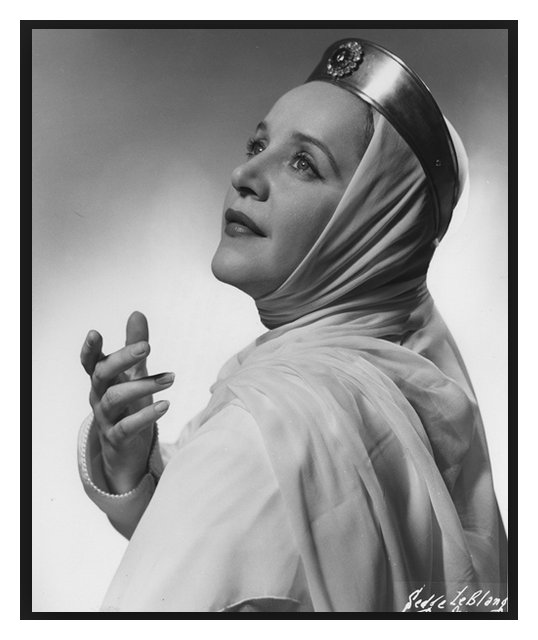 Eleanor Steber: There’s no real problem about that. Once you learn how to sing Mozart, all of these things sort of fall into the proper kind of life. Wagner is just an extension of the beautiful line that you get when you’re doing Mozart. The style is romantic and requires a great deal of expansion of tone and expression. But in a sense there is no real problem about that. I didn’t go very far with Wagner. I didn’t become only a Wagnerian. Experience is always a very funny thing; I made my debut as Senta in The Flying Dutchman when I was 21 years old. But that was when I was in school. I did Eva in Die Meistersinger, and _Lohengri_n at the Metropolitan and in Bayreuth and other places. And there were the smaller roles like Flosshilde, one of the Rhinemaidens, and the Forest Bird in Siegfried, but they were the smaller roles at the very beginning of my career at the Metropolitan.
Eleanor Steber: There’s no real problem about that. Once you learn how to sing Mozart, all of these things sort of fall into the proper kind of life. Wagner is just an extension of the beautiful line that you get when you’re doing Mozart. The style is romantic and requires a great deal of expansion of tone and expression. But in a sense there is no real problem about that. I didn’t go very far with Wagner. I didn’t become only a Wagnerian. Experience is always a very funny thing; I made my debut as Senta in The Flying Dutchman when I was 21 years old. But that was when I was in school. I did Eva in Die Meistersinger, and _Lohengri_n at the Metropolitan and in Bayreuth and other places. And there were the smaller roles like Flosshilde, one of the Rhinemaidens, and the Forest Bird in Siegfried, but they were the smaller roles at the very beginning of my career at the Metropolitan.
BD: But it seems to be very rare that you have a fine Mozart singer who is also doing Wagner.
ES: Oh, I don’t really think so. In the past it’s been done many times by the people who would have sung Mozart first. Then you became a Wagnerian soprano. One would say that seems to be a logical kind of progression, but that doesn’t make any difference because I did the Wagner and then I went back and did the Mozart.
BD: In my recollection you have to hark back to the days of Lilli Lehmann before you really get someone who would do both and alternate them in a career.
ES: There were a lot of people who did it, but it’s all a matter of excellent technique and beauty of line and tone. It’s not really any big deal.
BD: What about the ability to ride the larger orchestra?
ES: That just depends upon your own voice. I made my debut as Senta when I was 21, but I didn’t force the voice in any kind of way. It’s just the way the voice is placed, how it resonates, and how it carries through in an auditorium and over an orchestra.
BD: Now you sang Elsa [shown in photo at right] both at Bayreuth and at the Metropolitan. Was there a big difference in the sound, in the acoustics at Bayreuth because of the covered orchestra?
ES: I guess in a sense it was.
BD: Did that make it easier to carry?
ES: Bayreuth was a quite a remarkable place, of course. So was the old Met, don’t kid yourself! But Bayreuth was like a finely tuned violin as far as the acoustics were concerned, and the orchestra being down underneath the stage was something else again.
BD: Would that kind of arrangement work for the operas of Verdi or Mozart?
ES: No, it’s typical and quite right for the Wagnerian medium. I wouldn’t say that I would go so far to do Verdi or Mozart with a covered orchestra, but I must admit that there are sometimes today that the orchestras, no matter what they’re playing, play too loud for the singers.
BD: Without mentioning any names, is that the fault of the conductor?
ES: [Laughs] No, no, I won’t mention any names! They often get the orchestra to be very big. The voices have just got to be placed right and have their own timbre. Then they will carry. Thinking of Wagner, not that I ever did the whole role of Isolde, but I have done the Liebestod. I’ve also done Strauss roles, which are done usually by voices that are quite along the Wagnerian ground. I’ve done an awful lot of Strauss. The Strauss medium is the same as the Wagner, really. Strauss really requires the same thing. The only thing that Wagner needs is a sort of a longer, deeper sustaining sound so that it carries. As far as the voice is concerned, if your voice is in good control you should be able to do any kind of role. That’s the way the old singers did it. I’ve been able to do it all my life. It’s all a matter of coloring, and your approach to it.
BD: Then is it a mistake now for younger singers to get pigeon-holed?
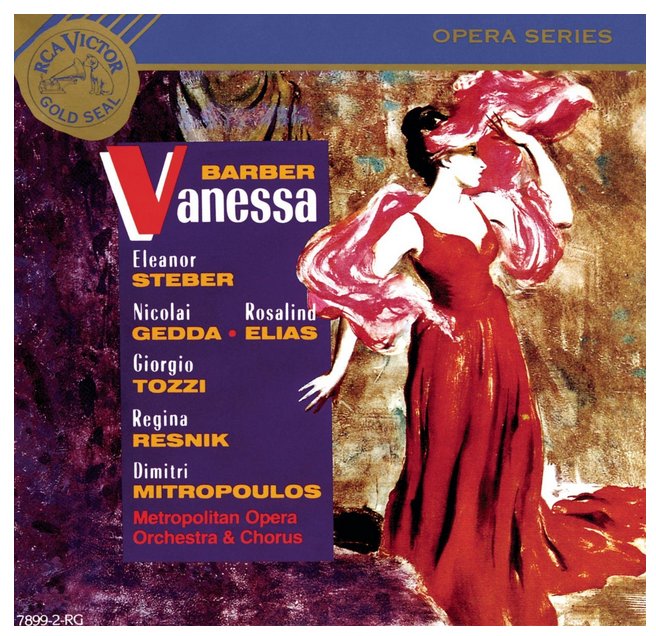 ES: I don’t think the younger singers ever have a chance to know where in the hell they are today! [Both laugh] They start out and they make a success in one part that would seem to have a rather large expanse, like a Wagnerian role, and all of sudden they’re being thrown into roles that are like that. They should have a variety which makes it possible for the voice to expand itself in all ways. Not only that, they have a tendency to start and do these things much too young. It was a fluke that I did Senta in The Flying Dutchman when I was 21. It was just very absurd, but I was very well cared for by my maestro who listened to me every day. I was not allowed to force anything, and he helped me to place the whole thing. But youngsters today are thrown in, and all of a sudden they come on and seem to have done a good Traviata. I can remember a critic who said one youngster sang Traviata like a young Steber. So because they said that, all of a sudden they throw her into Vanessa, and she’s no more capable of doing Vanessa that flying to the moon! [Both laugh] As a matter of fact, she came a cropper with it. She really nearly ruined her voice.
ES: I don’t think the younger singers ever have a chance to know where in the hell they are today! [Both laugh] They start out and they make a success in one part that would seem to have a rather large expanse, like a Wagnerian role, and all of sudden they’re being thrown into roles that are like that. They should have a variety which makes it possible for the voice to expand itself in all ways. Not only that, they have a tendency to start and do these things much too young. It was a fluke that I did Senta in The Flying Dutchman when I was 21. It was just very absurd, but I was very well cared for by my maestro who listened to me every day. I was not allowed to force anything, and he helped me to place the whole thing. But youngsters today are thrown in, and all of a sudden they come on and seem to have done a good Traviata. I can remember a critic who said one youngster sang Traviata like a young Steber. So because they said that, all of a sudden they throw her into Vanessa, and she’s no more capable of doing Vanessa that flying to the moon! [Both laugh] As a matter of fact, she came a cropper with it. She really nearly ruined her voice.
BD: So she should have stayed with the Verdi roles, and perhaps gone into Mozart rather than into Vanessa? [Vis-à-vis the recording shown at left, see my Interviews with Giorgio Tozzi and Regina Resnik. A cast-photo of the European premiere of Vanessa appears in the box at the bottom of this webpage.]
ES: Even with Verdi you’ve got to be careful. I did Traviata and that sort of thing, but I never went on to do Trovatore and others. I did them in concert version, and it doesn’t mean that I couldn’t have done them, but my career didn’t take me that way. People get the idea that you’ve got to have a ‘Verdi voice’, or you’ve got to have a ‘Wagnerian voice’, or you have to have a ‘Mozart voice’. A voice is capable of doing all of these things as long as it’s well framed and it’s not pushed into singing a role that requires more than it’s capable of doing at its time of development.
BD: Are there roles that demand too much of a voice?
ES: At certain times, yes; too much of a young voice, yes.
BD: Are there roles that simply cannot be handled by any human voice?
ES: I wouldn’t say so, no.
BD: Even something like Lulu?
ES: Well, I don
’t know Lulu. I did Wozzeck which is not as extensive a role as Lulu, but it certainly was completely different medium as far as I was concerned. I approached Marie wholly and completely from a singing standpoint, and for my vocal standpoint. The _Sprechstimme_gave me no problem whatsoever because I was always thinking of it from the standpoint of where my voice was placed.
BD: So the important thing is the placement of the voice?
ES: That’s right.
BD: Going back to Mozart a little bit, is it difficult to alternate music with spoken dialogue?
ES: You mean like The Magic Flute?
BD: Magic Flute or Abduction. Does this present special problems?
ES: It is always a little difficult. For instance, take South Pacific in which you were singing, then you would do a great deal of speaking. When you’re doing it night after night after night, that takes a tremendous toll on the vocal cords, but not the occasional Wozzeck, though that’s not really a spoken role. It’s half-sung, half-spoken. But the occasional_Magic Flute_ would not be that difficult. It really is wearing on the cords to go from a singing line to a speaking line. It puts a strain on the cords.
BD: Would it be better then to have the spoken dialogue changed into recitative?
ES: [Laughs] Whether it would right or not, it is not possible because that’s not the way the operas are written.
BD: What about something like Carmen where you could take out the spoken dialogue and make it recitative?
ES: That depends. In France they speak the recitatives a great deal. They are called_Opéra Comiques_ and are done in a different theater.
BD: One French role you sang was Manon. Tell me a little bit about her character.
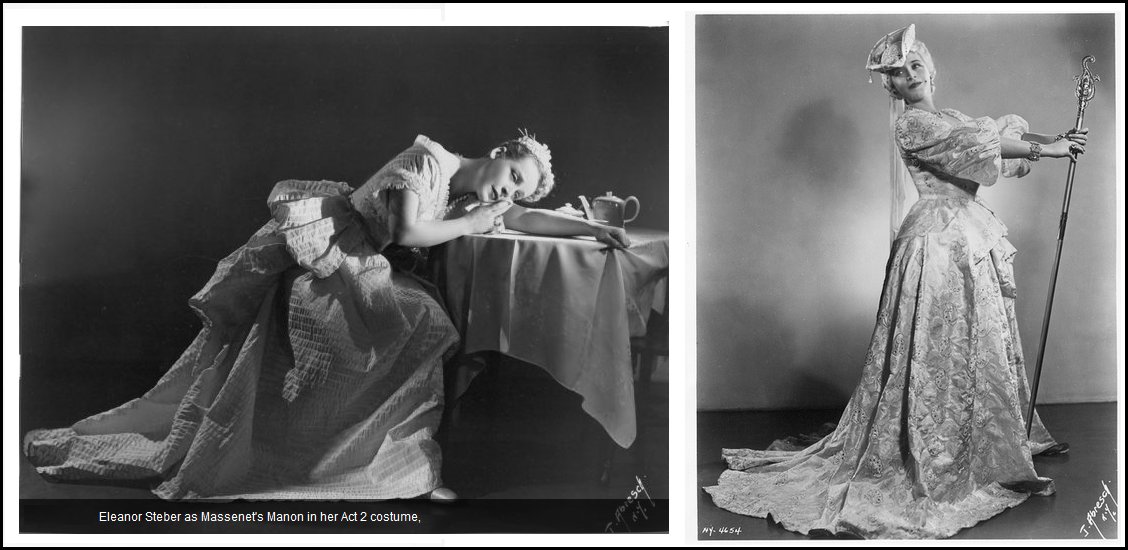
ES: Manon is beautiful, lyric, expansive. She’s a romantic type, and you use the same voice as you would choose in a Mozart or a Wagnerian work! It’s just that the medium is different and the music is different. If your technique is sufficient that you have no problem with these things no matter with the music is that you’re singing, you can sing anything. I believe this. I’m a living proof of it! [Bruce laughs]
BD: Is it right that composers make that kind of distinction between Grand Opera and Opéra Comique, or should it all just be a Musical Theater experience?
ES: A composer has his own ideas about what he wants the singer to do and about what he wants his operas to sound like. I don’t think that he should be limited in any way about doing what he wants to do, but the thing is to find a singer that’s able to do it!
BD: Are the composers always right?
ES: [Hesitates] I have found some of the works that I have done are pretty far out as far as stretching the voice is concerned, and I would advocate that anybody do them before their voice is well seasoned.
BD: Have composers taken the form of opera too far?
ES: Oh, I don’t think that it can be taken too far at all. A singer has to be careful about what he or she does within a certain period of time so that she does not put extra strain on the voice. For instance, I know a Penderecki score, which is really a way-out score as far as the voice is concerned. I have done Roger Sessions works in which there are jumps and changes of tessituras and that sort of thing. I think Lulu has a very strange tessitura, but a singer has got to know what she can do and what she can’t do. She must know her limitations and her abilities.
BD: How difficult is it to say no?
ES: [Laughs] We just hope that she has, as I have in my career, a mentor who would say, “Be careful about that, and if you can, put it off until another time!” But as far as my career was concerned, things just fell into place in their proper order. After a while, a lot of people thought that I was doing things much too heavy for me, and wondering what I was doing with my lyric voice when I sang things like Donna Anna. But in my estimation, Donna Anna is as lyric a role as you can possibly have. Not that I ever went beyond my capacity as far as my singing ability was concerned, but one role that I really feel took a great deal out of me, a great deal of strength and power, was the Lohengrin, and especially in the Wedding Scene. But when I did that I had I been trained. If I had been in a position where I was singing those roles constantly, which I don’t think is a good idea, my body and my voice would have found its level and would have built itself to the place where I was able to handle those things. Also remember that it also depends on where you are singing Wagnerian roles, where you are singing these big Strauss roles.
BD: When you were doing Elsa at Bayreuth, was that in the Wieland Wagner production?
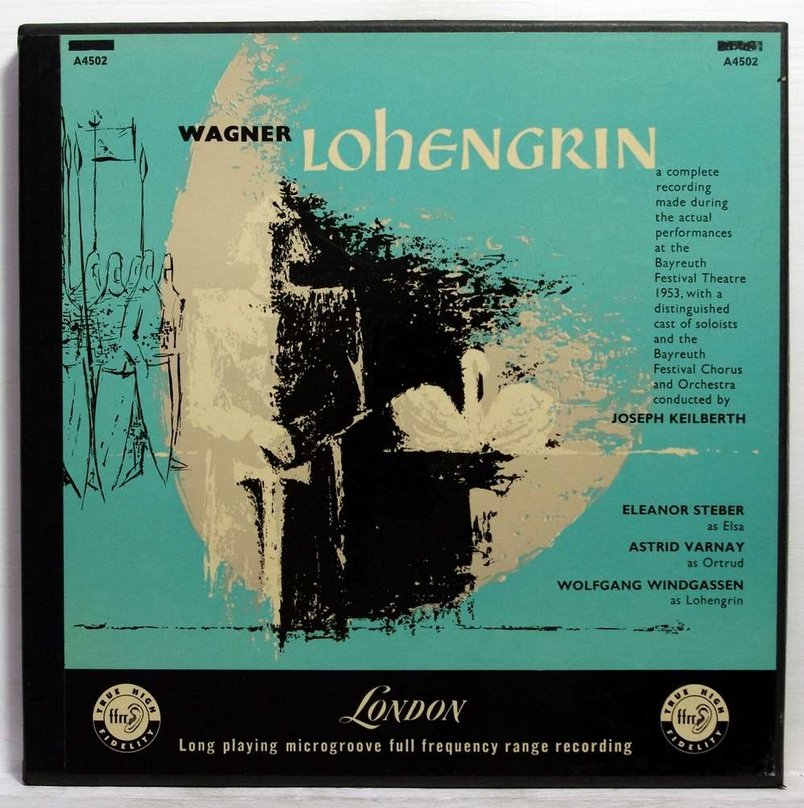 ES: No, it was Wolfgang’s first production.
ES: No, it was Wolfgang’s first production.
BD: Was he a help to the singers, or a hindrance?
ES: [Laughs] You had to do what he wanted to do. I don’t know whether he thought that he was a help or not! You just did what he wanted to do. It’s the same thing as what a conductor wants to do or what the composer asks of you. You’ve got to be capable of doing it!
BD: Was he not being flexible at all?
ES: Oh, honey, you can’t be flexible with the score! You mean as far as action is concerned?
BD: More the stage deportment and the ideas of where to move or how to move or how to project.
ES: I didn’t find that to be difficult. Elsa is a role that’s not very physically tiring.
BD: Is Elsa an interesting character?
ES: Oh, I loved her. A lot of people feel she’s kind of dumb, but I loved her. It was great music and it was a great experience. I hope you have the recording that was made at the time.
BD: Yes, of course.
ES: As you can tell, that was something. But I did all of these things with my own voice, meaning I didn’t try to make my voice different for this role or for that role. I sang as Eleanor Steber! That’s the best way to sing, I can tell you that. People who listen to other singers do roles and try to emulate them, eventually get into a lot of trouble because you cannot be somebody else.
BD: So each singer has to decide and find what he or she can do?
ES: That’s right.
BD: Is that a mistake that a lot of young singers are making by trying to do things they shouldn’t?
ES: The only thing that I can say about the young singers is that sometimes they attempt roles that they’re not ready for vocally. They are not mature enough vocally. They have not had enough experience under their belt or in their cords.
BD: Let’s go over to your other Wagner role, Eva. Was she fun to play?
ES: Oh, I loved Eva, yes.
BD: How much of a pixie is Eva? Does that word describe her at all?
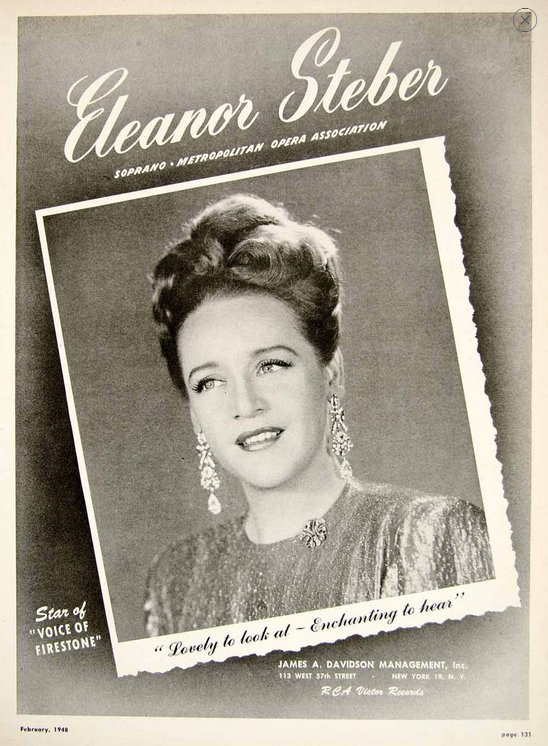 ES: Oh, no! Eva was a very, very serious, lovely German girl! She was no pixie! There was nothing like that about her. There was no fun. She was very serious.
ES: Oh, no! Eva was a very, very serious, lovely German girl! She was no pixie! There was nothing like that about her. There was no fun. She was very serious.
BD: [Surprised] She was not mischievous at all???
ES: Oh, I don’t think so, no!
BD: Do you think she would have been happy with Hans Sachs if Walther had not happened to come along at that particular time?
ES: Oh, yes. I think she was in love with Hans Sachs anyway.
BD: Then was she happy with Walther?
ES: I think so, but it was a matter of use. She was in love with Hans Sachs and his music and what he meant to her, being her mentor and all that. He was really like a father figure to her, and as you know many young girls have married older men because they are father figures, and have been perfectly happy. But if a young man comes on the scene and touches another chord in them, they run into a little trouble.
BD: So if Walther hadn’t come along, she would have been perfectly happy with Hans Sachs?
ES: I think so.
BD: It would have been a good marriage?
ES: I think so.
BD: Do you think she had a good marriage with Walther, or was he too impetuous?
ES: I think it could have been a little stormy because she was a very serious girl and she was very determined. She got what she wanted in the end, and Walther would have to be a pretty strong young man. I don’t think he went around running with the other girls, although you never can tell in those days. Things were very funny. I don’t think she looked sideways.
BD: So once she made the commitment, that was it?
ES: That’s right.
BD: If she had married Hans Sachs and Walther had come along, she would not have given him another thought?
ES: That might have posed a problem! [Giggles] She might have been tempted! But that doesn’t mean that she wasn’t serious.
BD: When you sing these characters, do you actually become the character on stage, or are you still Eleanor Steber singing a character?
ES: I become the character. I study my character and I put around it as much as I know of her background, and imagine myself as much that character as I possibly can. I do not allow Eleanor Steber to come out.
BD: All of this within a framework of projecting the voice and watching the conductor and playing off the scenery?
ES: Right! I’m sure I was watching the conductor during the music, but I was never conscious of any other thing except absolutely singing Elsa or Eva or Traviata. I was never conscious of any of those things except the role I was doing.
BD: Then did you take that role back to the dressing room with you, and back home that evening after the performance?
ES: There was only one that ever did that to me, and that was Marie in Wozzeck. When I went off the stage, all the other roles could have slipped off my shoulders very easily. Working into them and working in the rehearsals and working with my colleagues on the role, I had to project my imagination into the character that I was portraying. But after I had the character there and had portrayed her, I would go back to the dressing room and could have done the role all over again. The only role that ever bothered me or did anything to me was Marie, and that’s because it’s just so hopeless. The time and the period and the character of Marie was so pathetic.
BD: Is that the result of the character or the music, or both together?
ES: Both together. She was a very pathetic creature, and the fact that however she tried to live, whatever happened, he was trying to get her, and she comes to an untimely death with Wozzeck drowning her. Then the little kid at the end is unaware of the terrible forces of life that were involved in that opera. He is just hopping around on the stage at the end, a bit like the Simpleton at the end of Boris Godunov. He’s out there at the end of the opera commenting on the futility of life. I have had a happy and wonderful life, and when I got to a role like that I knew and felt the futility as if I were Marie. I could never be like that when I left that house, never being very happy.
BD: Then is it right to subject the audience to that kind of depression?
ES: The audience wants to be projected into it. Why do you think people go to see such things as that, or watch things on television like these murder mysteries? That’s what entertainment is. The audience wants to be taken there.
BD: So is opera entertainment, or is it art?
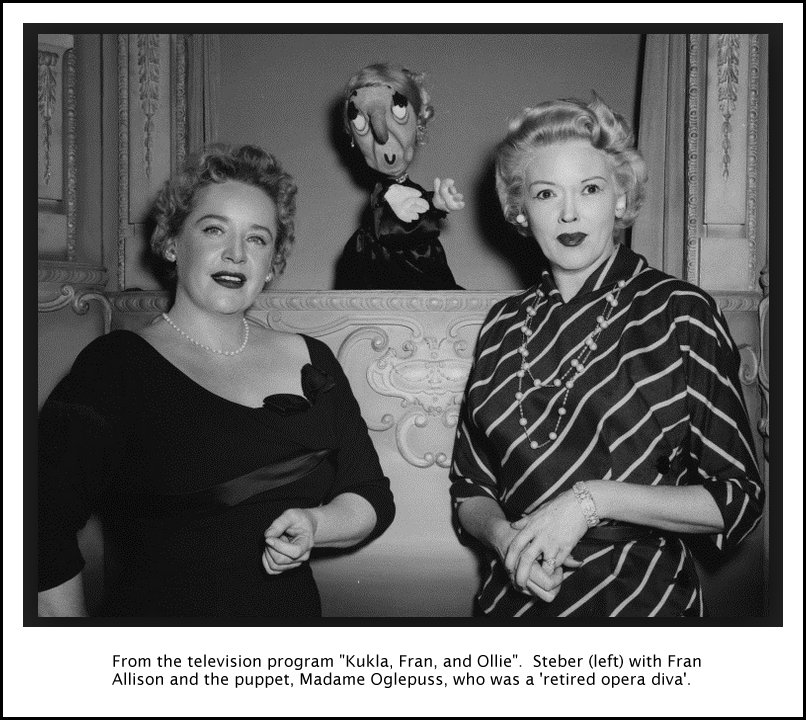
ES: It’s both. Mostly it’s like getting involved in a very profound play like Mourning Becomes Electra or The Iceman Cometh, or something like that. You’re really getting profoundly involved in it, but it depends on what opera you’re watching. If you’re watching Meistersinger, you can have differing emotions, and if you’re watching _Così fan tutte_you come out feeling you’ve had a nice experience. This happens with many operas, especially the funny ones, but then a lot of them leave you with tears. I was always left with a kind of a sadness after I’d finished singing Butterfly, but people love Butterfly because they want to sit there and cry with her. They want to be made to cry. They want their emotions to be stirred, and in many respects opera does more than anything. Music itself is the one thing that stirs the emotions more than this stuff that you see on television. That stuff is for the birds. It doesn’t stir anything up, and I think that’s the reason some people go to the opera... though many, many people just go to hear singers and that’s all there is to it. [Laughs]
BD: It then degenerates into a vocal marathon!
ES: Yes, I think that’s true many times.
BD: That’s the wrong way to approach opera?
ES: I think so!
BD: Does opera belong on the television?
ES: I watched_Rigoletto_ last night, which was very well done. I must say, I think that the proximity of the television screen takes away a bit of the glamour, no matter what you do to dress it up. Did you see the Rigoletto?
BD: No, I was working at the radio station last night. I did not see it, but I’ve seen opera on television a number of times.
ES: The ones that are done from a stage itself, in which you are watching a performance on the stage, carry much more of the magic than these which are particularly made for the television in which there are close-ups and all that sort of thing. I don’t care so much for the ones that have been made strictly for the movies in which they can do all kinds of tricks like close-ups , and having a singer sing everything beforehand and then mouth it on the screen. It takes away a lot of the glamour and a lot of the lovely feeling about opera for me.
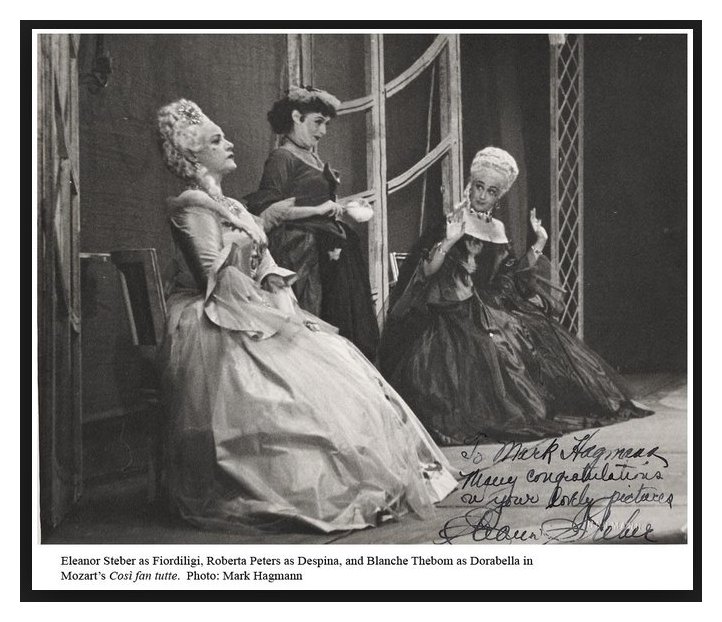 BD: So live opera has to have more immediacy?
BD: So live opera has to have more immediacy?
ES: It has to have more expanse than the television can give it.
BD: Does having the translation underneath help or hurt?
ES: I don’t think it hurts. You become used to it.
BD: Would it be better to do opera in English?
ES: I haven’t found it offensive. [Vis-à-vis the photo at left, see my Interviews with Roberta Peters and Blanche Thebom.]
BD: You’ve done a number of operas in English, so I just wonder is that a better solution?
ES: The operas that I have done in English have been a very successful, and I felt very good about them. I like doing opera in English when there’s a good English translation.
BD: Do you work harder at your diction when it’s in the language of the audience?
ES: No. You see, when we Americans came along, we had to sing French better than the French people and we had to sing German better than the Germans and we had to sing Italian better than the Italians. Aside from Flagstad, they’d never really tried to sing English. I happen to have been a Drama major, and worked a great deal on my English diction before I got into opera. But I also had a technique that I was able to sing the English through so that it could be understood. I am known that my English diction was one of the best!
BD: You were exemplary!
ES: Oh, thank you. That’s because I placed the English and sang the English in the same way as I sang all the other languages. It’s a matter of where you place the vowels, and that you are very exact
— as I was with my other languages.
BD: When you’re singing in English, did you find a closer communication with the audience because you knew they were getting every word?
ES: Oh, yes, it’s much more fun to do that. It’s much more fun to do Così fan tutte, for instance, and even Seraglio. I did both of them onstage in English, and the audience got the jokes and the fun much more. I did concert versions of The Marriage of Figaro in English, but not onstage. I also heard glorious English translations of Massenet’s_Manon_, for instance.
BD: Then why doesn’t the Met do more operas in English?
ES: [With a huge laugh] That’s the Met’s problem, honey! That’s not mine! [Both laugh]
BD: Should American opera companies do more opera in English?
ES: Oh, I think a lot of them are.
BD: It seems the smaller ones do, but the big companies rely on the original languages.
ES: Well, I think there’s an awful lot of chauvinism involved in that. They just say they’d better do them the way they were originally written and let the audiences fend for themselves.
BD: Other singers have talked to me about the closeness they feel
— the melding of the words and the music — and when you change the words it upsets the musical line.
ES: That depends upon the translation, my dear. For instance, I’ve seen some horrible translations, and have really tried to sing some horrible translations of The Marriage of Figaro. But having a little bit of knowledge about language, I’ve just changed them so that it suited the voice better. That’s all.
BD: So what we need is better translations?
ES: I think so.
BD: Let me take you back to 1954, here in Chicago. You were in the Don Giovanni, which was the ‘calling card’ for Lyric Opera. Was that special, knowing that you were involved in the rebirthing process of an opera company?
ES: Oh, I didn’t think of that at all. I was only conscious of the fact that I was doing my first Donna Anna, and for which I was very grateful. I had been hoping, agitating with the management at the Metropolitan about it. When I was in Edinburgh, Scotland, I first did the Countess there in 1947, and Mr. Bing asked me back. He wanted me to do Donna Elvira. Well, I had done Donna Elvira at the Metropolitan, and the thing that I wanted to do more than anything else was Donna Anna. I was not able to do it then, and nobody thought I was the right Donna Anna. Strangely enough, when I finally did it they said there’s never been a Donna Anna like mine! My maestro had told me when I was still in school,
“Your role in Don Giovanni is Donna Anna because it’s really not a big dramatic role.” But others kept saying, “Oh you have to have a dramatic singer do this!” We’re talking about times and things, and times have changed so much and ideas have changed so much that it really bothers me, and I almost feel like a ghost. But I was very pleased that Chicago asked me to do this role. I was thrilled and impressed, bit as a singer you can’t allow yourself to be too impressed by this or that. You have to just get out there and do the role, and do the part the best way that you know how.
BD: [Meaning no disrespect] But isn’t singing a role like that more than just a job?
ES: Oh, but of course! I never meant to infer anything like that. Every time I walked on the stage it was like I was walking into my life. It was my life. It was not a job. But the thing is I had sung in San Francisco, I had sung in Edinburgh, I had sung in Bayreuth and other places throughout the country and throughout the world. Then when I returned to Chicago in 1956, I opened the season with The Girl of the Golden West. It seemed as though I sang practically every role on that season!
Eleanor Steber at Lyric Opera of Chicago
1954 - [February] - Don Giovanni (Donna Anna) with Rossi-Lemeni, Jordan, Sayão,Simoneau, Brownlee, Alvary; Rescigno
[Fall] - Tosca (Tosca) with Di Stefano, Gobbi,Stewart, Badioli, William Mason (Shepard Boy); Rescigno
1956 - [Opening Night] Fanciulla del West (Minnie) with Del Monaco, Gobbi, Wildermann; Mitropoulos
Andrea Chénier (Maddalena) with Del Monaco, Gobbi; Buckley
Traviata (Violetta) with Simoneau, Bastianini, Foldi, Ardis Krainik (Annina); Bartoletti
Don Giovanni (Donna Anna) with Rossi-Lemeni, Likova/Lind, Wilson, Simoneau, Corena; Solti
1957 - Marriage of Figaro (Countess) with Gobbi, Moffo, Berry, Simionato, Badioli; Solti
Tosca (Tosca) with Di Stefano/Bjoerling, Gobbi, Smith, Badioli, William Mason (Shepard Boy); Bartoletti
1958 - Traviata (Violetta) with Simoneau, Bastianini, Foldi, Ardis Krainik (Annina); Serafin
BD: Is it easier to come to an opera house doing several roles rather than just one role?
ES: I don’t think it’s a matter of easiness or not. If you’re able to do it, if the roles are in your repertoire, it’s the same way as if you’re in a house. I had sung three roles within one week at the Metropolitan! A matter of fact I’ve sung two roles within one day!
BD: I was just going to bring up the day when you sang one role in the afternoon and then another role in the evening!
ES: Right! Desdemona and Fiordiligi [February 9, 1952].
BD: Was that a mistake to have them in your contract, or was it because of circumstances?
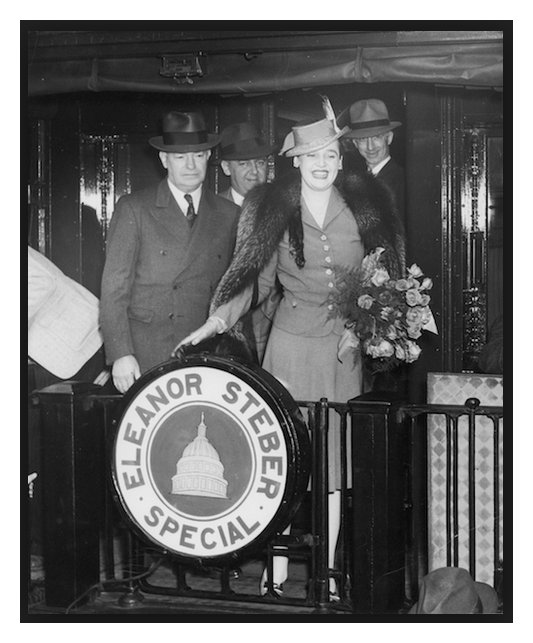 ES: No, it just happened because I was so unhappy that I wasn’t going to be able to sing the last show! So I thought maybe I could do it! I talked about it, and after doing Desdemona, I could do Così fan tutte. I could do it in my sleep!
ES: No, it just happened because I was so unhappy that I wasn’t going to be able to sing the last show! So I thought maybe I could do it! I talked about it, and after doing Desdemona, I could do Così fan tutte. I could do it in my sleep!
BD: But I assume you wouldn’t recommend doing that very often.
ES: Well, I wouldn’t mind! [Both laugh] I wouldn’t do it every week, but there were times when I did three and four performances of different roles in one week’s time at the Met.
BD: Are young singers these days perhaps singing too much, too many times in a week and too many roles?
ES: I don’t know about that because I don’t know how much young singers are singing.
BD: Then let me change it from young singers to established singers. It seems like the jet engine is burning out so many singers.
ES: That is the problem more than anything else. They are singing too many things in too many places all over the world, so they do not get themselves a proper resting time.
BD: So it’s not the singing of too many performances, but it’s that combined with the travel?
ES: That’s exactly right. Can you imagine doing a role like Desdemona on one day, then traveling out to the West Coast and singing Così fan tutte not the next night but the night after that? Then hopping up over to Vienna and doing something two nights later?
BD: How can we get some of these big starts to quit the globe-hopping so much?
ES: That’s not my problem. I’m out of it!
BD: Oh, but you can influence some people!
ES: [Laughs] I’m past the time of trying to influence anybody. All I want to do is try to direct my pupils, the people who are studying with me, and give them a bit of my knowledge and expertise. Hopefully they’ll listen to me! However, the managements won’t let them listen to me.
BD: Doesn’t it come up in a voice lesson where you discuss the travel and warn them not to fall into that trap?
ES: At this point I don’t have the singers that are at a place where they’re traveling that much back and forth and here and there.
BD: Do you enjoy teaching young singers?
ES: Yes, I do. I like to bring them along the line, and get them started with a good technique.
BD: Are the operatic voices today better or worse than they were twenty, thirty or forty years ago?
ES: I don’t think you should ask me that.
BD: I mean, just from a listening standpoint?
ES: I don’t listen to them that much. I’ve gotten to the place where I hear them and some of them impress me, some of them don’t. I’ve never ever criticized any of my colleagues when I was working with them, and unless I travel ten miles in their moccasins, I cannot say what it’s like.
BD: Let me ask about recordings. Are they a help or a hindrance to the public?
ES: They certainly are a help to keep the people in front of the public, and there are good recordings which project a role so that people are remembered for posterity.
BD: Tell me about working with Toscanini.
ES: He was a very, very great maestro, as everybody knows.
BD: Was he as demanding as legend has it?
ES: Yes, he was demanding and he was a stickler for detail in every respect. I flabbergasted him because when I auditioned for him I went in with my role completely memorized. He couldn’t believe it.
BD: He was surprised that someone would be that prepared?
ES: Yes, he was surprised with a young singer like myself at that time. I had only been in the Met for about two years. I went in with the part of Marzelline and sang it for him without a score. He couldn’t believe it. After I sang the whole thing, then he took me through it and suggested some things. But there was never any problem with maestro. I just followed what he asked me to do, and it was right.
BD: But first he let you sing through to hear what you could do?
ES: Yes.
BD: Would other maestros with whom you worked also do that?
ES: Oh, they all had their own different ways. Working with Toscanini was a unique thing, but I let it be known that when I went in to do a role at rehearsal, even if I was singing it for the first time, my musicianship and ability was such that I was always able to sing the role and do it in such a way that it made sense and made it singable.
BD: Are you optimistic about the future of opera?
ES: [Laughs] Opera will live as long as there are people who want to listen, and people who know how to sing. New operas are going to come along that are going to be almost different idioms, and our young people are going to be able to do them. I’ve heard some remarkable things done in recent years. I don’t know whether they’re operas or whether they’re Music Theater, but the thing is that opera in one form or another will continue to live because it is one of the great art forms. Whether it is half-spoken or half-sung, as long as it has the ability to change people’s lives, and if they will sit for three or four hours in the houses, and as long as it has that magic, it will continue to live.
BD: I really appreciate your taking the time to talk with me this afternoon. You’ve given a lot of insight and ideas.
ES: That’s wonderful. It’s very nice to talk with you.
BD: Thank you very, very much, Miss Steber.
ES: You’re welcome, my dear.
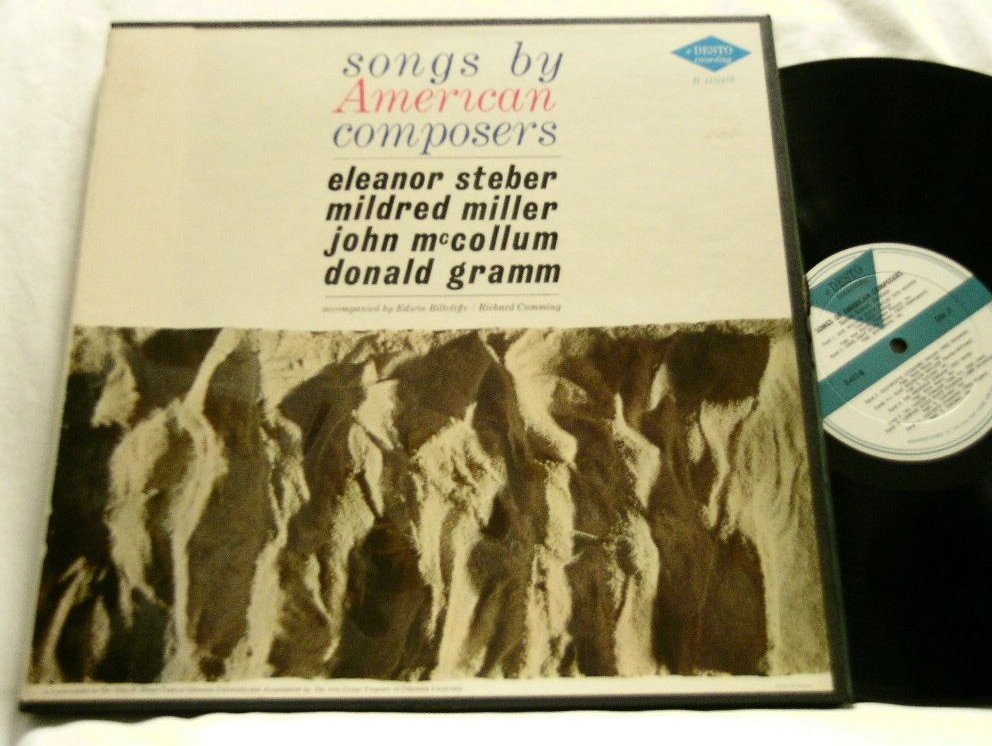
This recording includes songs by Ernst Bacon, Samuel Barber, Jack Beeson, William Bergsma,
John Alden Carpenter, Theodore Chanler, Aaron Copland, Henry Cowell,David Diamond,
John Edmunds, Irving Fine, William Flanagan, Charles Tomlinson Griffes, John Gruen,
Charles Ives, John La Montaine, Otto Luening, Edward MacDowell, Douglas Moore,
Vincent Persichetti, Ned Rorem, Virgil Thomson, and Robert Ward.
The pianists are Edwin Bilcliffe, and Richard Cumming.
Also see my interview with Donald Gramm.
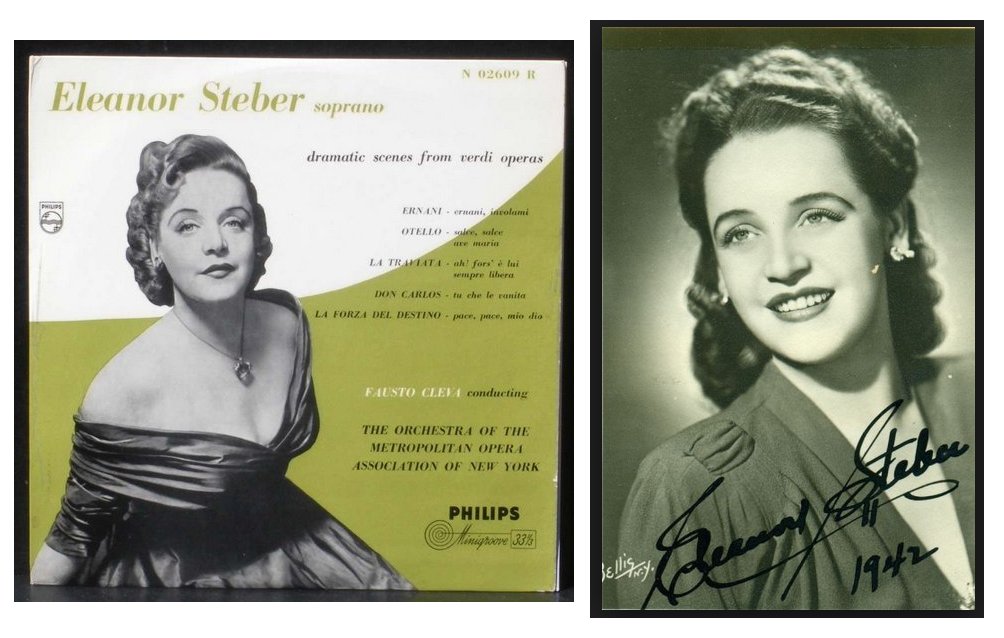
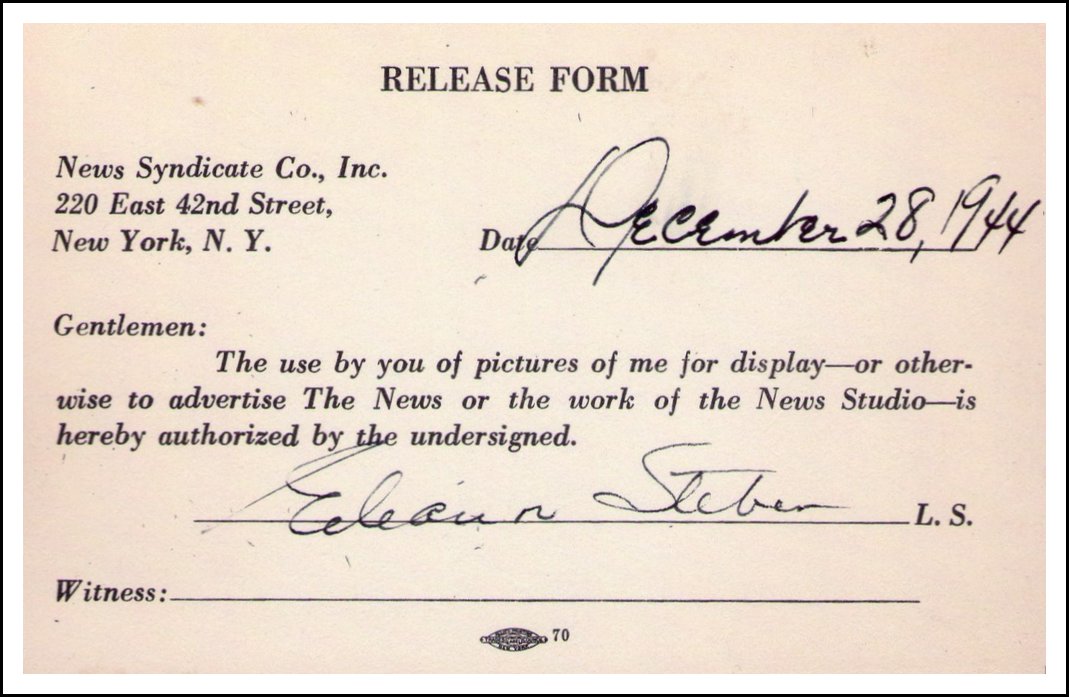
© 1985 Bruce Duffie
This conversation was recorded on the telephone on March 16, 1985. Portions were broadcast on WNIB the following year, and again in 1994, 1999, and 2000. This transcription was made in 2016, and posted on this website at that time. My thanks to British sopranoUna Barry for her help in preparing this website presentation.
To see a full list (with links) of interviews which have been transcribed and posted on this website,click here. To read my thoughts on editing these interviews for print, as well as a few other interesting observations, click here.
Award - winning broadcaster Bruce Duffie was with WNIB, Classical 97 in Chicago from 1975 until its final moment as a classical station in February of 2001. His interviews have also appeared in various magazines and journals since 1980, and he now continues his broadcast series on WNUR-FM, as well as on Contemporary Classical Internet Radio.
You are invited to visit his website for more information about his work, including selected transcripts of other interviews, plus a full list of his guests. He would also like to call your attention to the photos and information about his grandfather, who was a pioneer in the automotive field more than a century ago. You may also send him E-Mail with comments, questions and suggestions.
